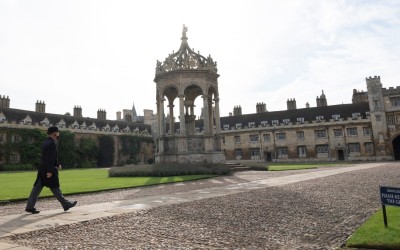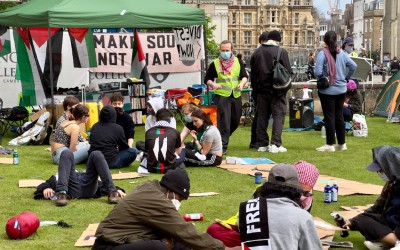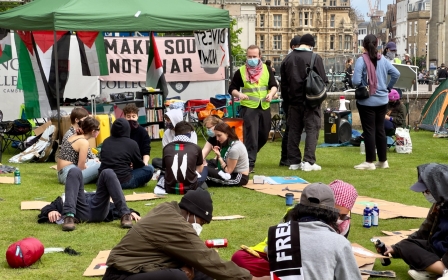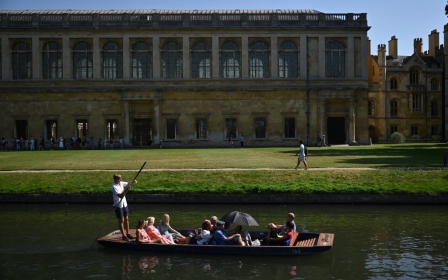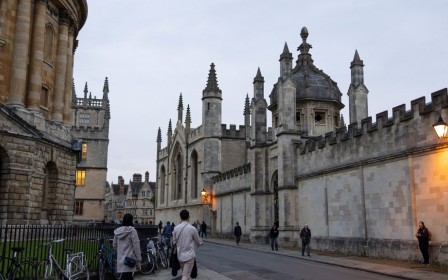Trinity College Cambridge 'misled' students over Israel arms investments
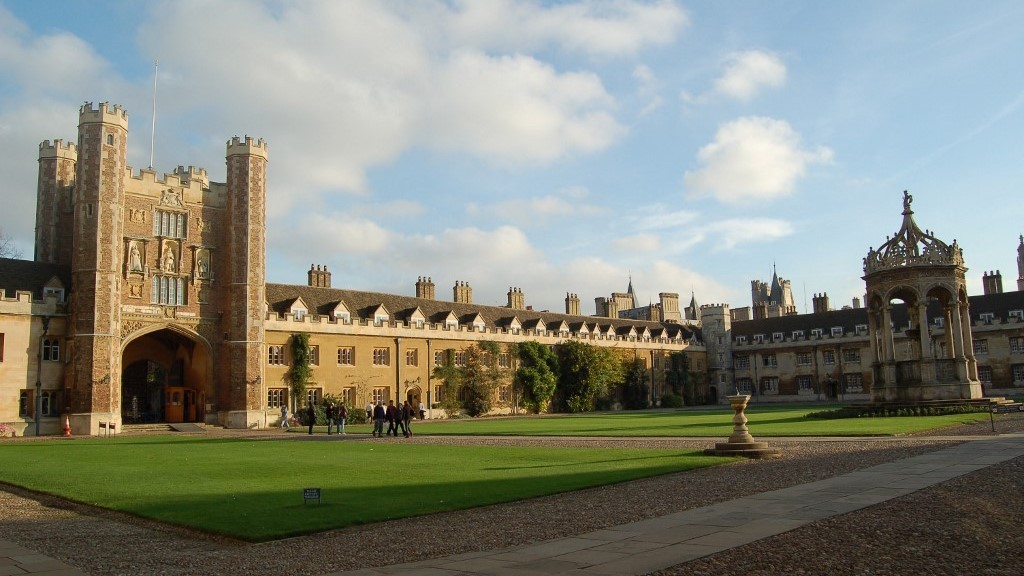
The wealthiest college at the UK's University of Cambridge, of which King Charles is a member, has been accused of misleading students by failing to deny reports that it was divesting its investments in arms companies.
Trinity College Students' Union (TCSU) announced in early May that senior members of the college had told them the institution would divest from all arms companies "by the summer".
However, earlier this month, the master of the college, Sally Davies, told student representatives that the college had not divested and had no plans to divest.
On Friday afternoon, the undergraduate and postgraduate student unions sent a letter to the college council, calling on Trinity to immediately remove its investments in arms companies.
Multiple students told Middle East Eye they felt "misled" by the college.
New MEE newsletter: Jerusalem Dispatch
Sign up to get the latest insights and analysis on Israel-Palestine, alongside Turkey Unpacked and other MEE newsletters
One, who asked to remain anonymous, said: "It seems that for months, Trinity allowed its students and others to incorrectly think it was divesting from arms companies."
MEE revealed in February that the prestigious Cambridge college, which is one of Britain's wealthiest landowners, had $78,089 invested in Israel's largest arms company, Elbit Systems, which produces 85 percent of the drones and land-based equipment used by the Israeli army.
MEE also reported that the college had millions of dollars invested in other companies arming, supporting and profiting from Israel's war on Gaza.
There were multiple student protests over the following months.
On 7 May, the International Centre of Justice for Palestinians (ICJP), a UK-based rights group, submitted a formal complaint to the Charity Commission requesting an investigation into Trinity’s investments. This followed the ICJP issuing two successive legal notices to the college in response to MEE's initial report.
Shortly afterwards, the TCSU announced that its administrative body, the college council, had voted to divest from arms companies.
"The latest update is that Trinity will be and is in the process of divesting; however, the college will not be making a public statement on the matter," the union president was recorded as saying on 11 May.
Another member of the student union committee added: "We have been told the college council voted to divest."
But when MEE put this to Trinity College, it declined to confirm or deny that the vote took place. Instead, it said: "Trinity College continues to review its investments regularly."
Over the next three weeks, Trinity declined to respond to MEE's multiple requests for comments on its investments.
In late May, the student union publicly called on the college to show "greater transparency" regarding its investments, adding that "members of the college have indicated... that the college plans to divest from arms companies over the summer".
In addition, MEE learned that multiple students at Trinity emailed the college leadership in May, seeking clarification on its investments, but they received no response.
One of the students, who asked to remain anonymous, told MEE at the time that they wanted the college "to be more open about their decision to divest from arms companies", adding that "we deserve to hear this news confirmed directly from them".
There was no public response from the college.
'No interest in divesting'
Months later, in November, after the new academic term had begun, many students were shocked when it emerged that the college's master said the college had "no interest in divesting from arms companies" during a meeting with Trinity's undergraduate and postgraduate students' unions.
Freedom of information requests, seen by MEE, show the college has maintained its investments in arms companies, including Elbit Systems.
One Trinity student told MEE: "If the college didn't want students to believe it was divesting, why didn't it publicly clarify the truth back in May?
'It's deeply shameful that the college has misled its students'
- Anonymous Trinity student
"It seems that for months, Trinity allowed its students and others to incorrectly think it was divesting from arms companies," the student added.
"It's deeply shameful that the college has misled its students by not being transparent regarding its investments. As members of Trinity, we should not have to wait for news articles to be written to find out what the college is choosing to do with our money.
"It's unbelievable that Trinity still chooses to continue these investments despite their possible implications in war crimes and crimes against humanity."
On Friday, the undergraduate and postgraduate student unions sent a letter to the college council expressing concern that "the college continues to hold investments in the arms industry and companies complicit in and profiting off wars around the world".
The letter, seen by MEE, notes that the master told students that "the college was disinterested in student engagement in the process of divestment".
It calls on Trinity to "immediately divest and sever all ties with companies in the arms industry and all companies complicit in the war in Gaza" and to "establish an oversight committee consisting of students, fellows and staff to draft and implement an ethical investment policy for the college".
MEE has contacted Trinity College for comment.
This development comes after pro-Palestine student protesters restarted their encampment last weekend, which had begun in May and ended over the summer.
Cambridge encampment restarted
On Friday evening, students claimed a "liberated zone" at Cambridge University's Greenwich House. Lebanese and Palestinian flags were raised as students occupied the administrative building, which houses key university functions such as its estates, finance and human resources divisions.
Cambridge University's administration operates separately from Trinity College.
The students said the protests are in response to the university "breaking" its agreements regarding an ongoing review of its arms investments.
In July, Cambridge University reached an agreement with students following months of protests, prompting Cambridge for Palestine (C4P) to end its encampment.
As part of the agreement, the university committed to funding opportunities for Palestinian academics and students to go to Cambridge, and pledged to form a working group - including student representatives - to review investments.
However, C4P now says the university has "stalled" on its commitments, removed Palestine from its review of arms ties and "weaponised bureaucracy to reduce student power".
Cambridge has acknowledged delays in its review of defence investments and even postponed its initial deadline for findings from the end of the term to the end of the academic year.
The encampment expanded on Wednesday to the lawn outside Senate House, the university's central management building, and continues to grow.
Middle East Eye delivers independent and unrivalled coverage and analysis of the Middle East, North Africa and beyond. To learn more about republishing this content and the associated fees, please fill out this form. More about MEE can be found here.


